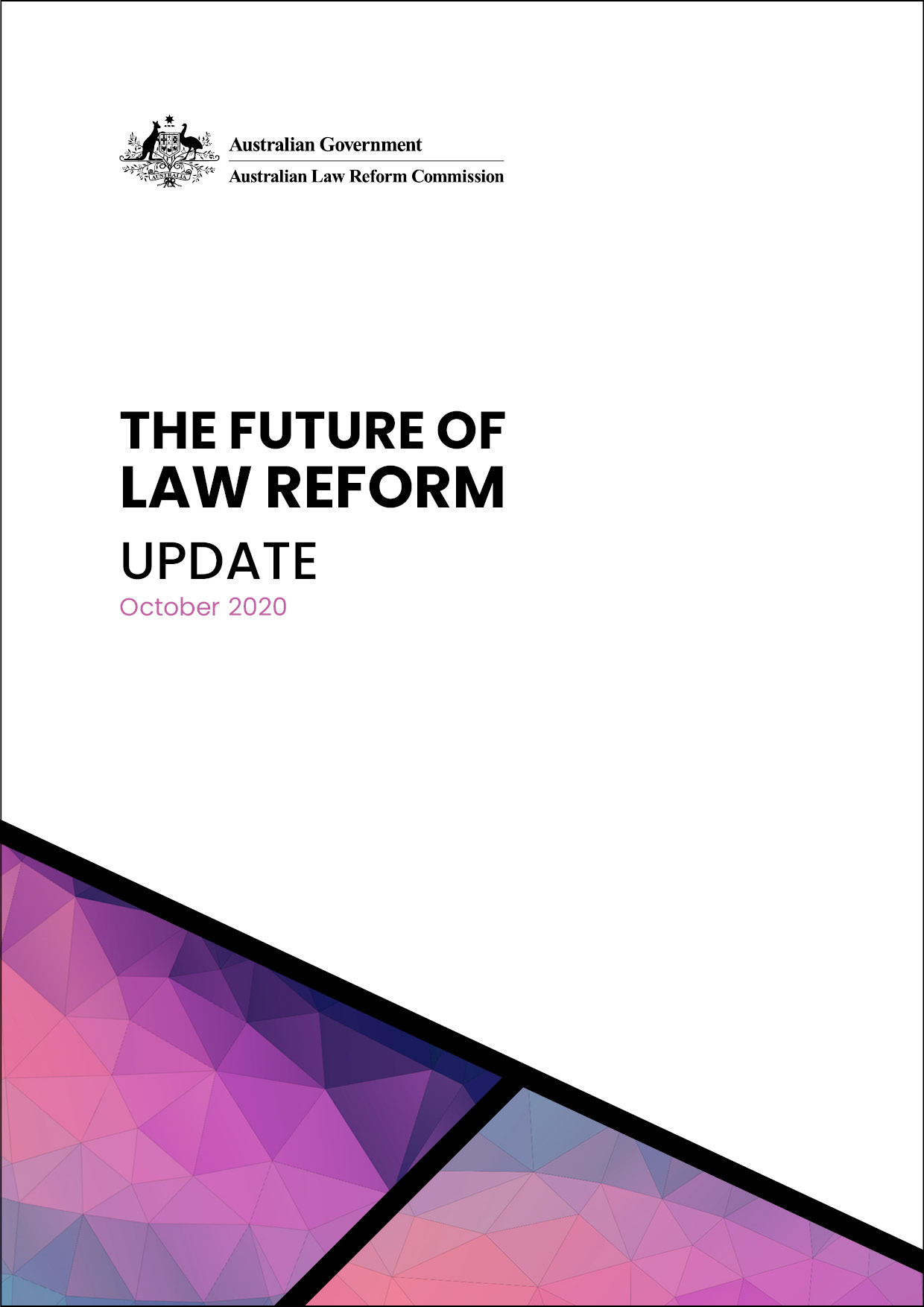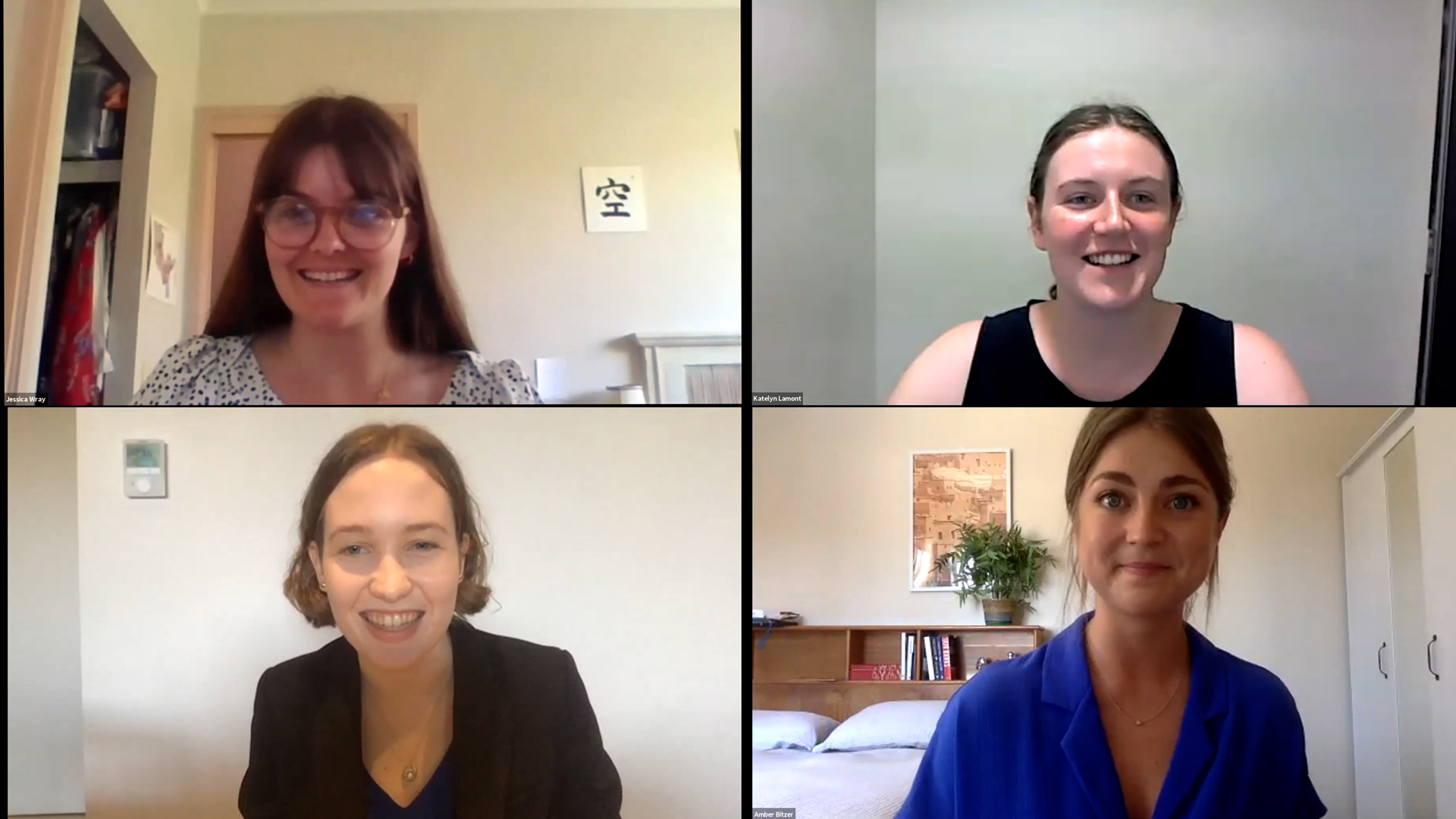04.11.2020
Future of Law Reform Update
 The ALRC’s Future of Law Reform report of December 2019 suggested five potential topics for future law reform inquiries. In September 2020 the Commonwealth Attorney-General referred to the ALRC one of those suggested inquiry topics, on simplification of corporate and financial services regulation. The Future of Law Reform Update summarises recent feedback on, and developments in, the other four topic areas for the Attorney-General to consider in relation to the ALRC’s ongoing program of work. The paper also briefly outlines a selection of key developments in other significant topics identified in the primary report.
The ALRC’s Future of Law Reform report of December 2019 suggested five potential topics for future law reform inquiries. In September 2020 the Commonwealth Attorney-General referred to the ALRC one of those suggested inquiry topics, on simplification of corporate and financial services regulation. The Future of Law Reform Update summarises recent feedback on, and developments in, the other four topic areas for the Attorney-General to consider in relation to the ALRC’s ongoing program of work. The paper also briefly outlines a selection of key developments in other significant topics identified in the primary report.
View the Future of Law Reform Update >>
Regulation expert joins the Financial Services Inquiry
The ALRC welcomes Associate Professor Andrew Godwin as Special Counsel for the Review of the Legislative Framework for Corporations and Financial Services Regulation.
The addition of Associate Professor Godwin strengthens the range of experts on the Inquiry advisory committee, comprising judges, government representatives, practitioners, and academics with vast experience in financial services.
Inquiry Process Evolves
The Judicial Impartiality Inquiry will benefit from a new approach to consultation documentation. The primary purpose of this evolution is to facilitate valuable submissions to the law reform process by producing documentation that is accessible and practical for a broad range of contributors. Following consultations and feedback from a variety of stakeholders, the redesigned consultation paper will be a standalone document, with supporting background papers available for further in-depth examination of the research and reasoning underpinning ALRC proposals and recommendations.
The first background paper will be released in late November which will provide an introduction to the key aspects of law on judicial bias as it relates to the Australian federal judiciary. A collection of background papers will follow. Each paper will examine a fundamental issue or circumstance, supported by rigorous and principled legal analysis, relevant to the Inquiry.
The consultation paper will be released in April 2021, and a formal call for submissions will be made at that time.
Corporate Criminal Responsibility Articles
Corporate crime: Directors’ and officers’ liability on the map
Read ALRC Acting Principal Legal Officer Sarah Fulton’s article examining the ways in which directors and senior executives can – and should – be held responsible when companies break the law following the ALRC’s Corporate Criminal Responsibility Final Report findings.
Sentencing corporations: Can the punishment fit the crime?
Read ALRC Legal Officer Phoebe Tapley’s article examining the recommendations made to improve the processes and outcomes of sentencing corporations in the Corporate Criminal Responsibility Final Report.
Australia considers new approaches to corporate criminal liability
Matt Corrigan (ALRC General Counsel) and Samuel Walpole (ALRC Legal Officer) feature as contributors on Harvard Law School’s Global Anticorruption Blog discussing new approaches to corporate criminal liability recommended by the ALRC in the context of reforms to foreign bribery laws in the UK.
Closing the gap on business and human rights
Read ALRC Legal Officer Tess Van Geelen’s article published in Human Rights Pulse outlining the ALRC’s recommendations in light of international treaty developments and the Juukan Gorge tragedy, highlighting the urgent need for substantial reform in this space.
View the Corporate Crime Report >>
ALRC research benefits from honours students’ projects
For the fourth consecutive semester, the ALRC has supervised students’ research projects as part of The University of Queensland’s LAWS4114 honours course. Law students Jessica Wray, Katelyn Lamont, Chantel Morris and Amber Bitzer recently presented a summary of their research projects to the ALRC team for feedback. The calibre of the research – across complex legal issues – was impressive and will contribute to future ALRC outputs.
During the semester, students undertake projects that are relevant to the ALRC’s work, providing research that would not be possible within the resource constraints of the ALRC. The students gain valuable insights while also building awareness of how law reform contributes to broader policy goals across Government.
Thank you Jessica, Katelyn, Chantel, and Amber for your important contributions to the ALRC research process.

